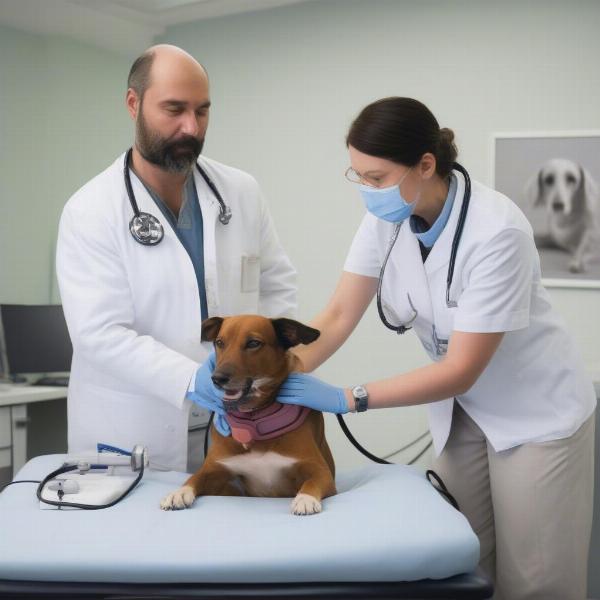An echocardiogram, often referred to as a cardiac ultrasound, is a vital diagnostic tool for assessing your dog’s heart health. It provides a detailed moving image of the heart, allowing veterinarians to identify a wide range of cardiac issues, from subtle murmurs to complex structural abnormalities. Understanding what an echocardiogram entails, why it might be recommended for your dog, and what the results can reveal can empower you to make informed decisions about their care.
 Dog Undergoing Echocardiogram
Dog Undergoing Echocardiogram
Why Might Your Dog Need an Echocardiogram?
Several signs may prompt your veterinarian to recommend an echocardiogram for your dog. These include a heart murmur, irregular heartbeat, coughing, difficulty breathing, fainting episodes, or exercise intolerance. echocardiogram dog Breed predispositions to certain heart conditions also play a role, so your vet might suggest this test even in the absence of overt symptoms. Early detection of heart problems is crucial for effective management and can significantly improve your dog’s quality of life.
What Happens During a Canine Echocardiogram?
The procedure itself is non-invasive and generally painless for your dog. They will typically lie on their side while a veterinarian or veterinary technician applies a special gel to their chest. A transducer, which emits sound waves, is then moved over the chest area to create real-time images of the heart. ekg for dogs The entire process usually takes 30-60 minutes and rarely requires sedation.
Interpreting the Results
Your veterinarian will interpret the echocardiogram results, assessing the size and shape of the heart chambers, the function of the heart valves, and the overall efficiency of the heart’s pumping action. This comprehensive evaluation helps identify various conditions such as dilated cardiomyopathy, mitral valve disease, and congenital heart defects.
“Early diagnosis through echocardiography is invaluable,” explains Dr. Emily Carter, DVM, a board-certified veterinary cardiologist. “It allows us to implement appropriate treatment strategies and monitor the progression of heart disease, ultimately extending and improving the lives of our canine patients.”
What are the Different Types of Echocardiograms for Dogs?
There are two main types of echocardiograms: two-dimensional (2D) and Doppler. 2D echocardiograms provide structural information about the heart, while Doppler echocardiograms assess blood flow. Your veterinarian will determine the most appropriate type based on your dog’s individual needs. cost of dog echocardiogram Both provide valuable insights into your dog’s cardiovascular system.
Caring for a Dog After an Echocardiogram
Following the echocardiogram, your dog can typically resume normal activities immediately. There are no special post-procedure instructions, though your veterinarian may recommend follow-up appointments to monitor any detected heart conditions. They will also discuss any necessary lifestyle changes or medications, such as heart tablets for dogs or vetmedin 5mg for dogs, to manage the condition effectively.
Conclusion
An echocardiogram is a safe and effective way to evaluate your dog’s heart health. By understanding this procedure and its potential benefits, you can play an active role in ensuring your furry friend receives the best possible cardiac care. Early diagnosis and proactive management are key to a longer, healthier life for your beloved companion.
FAQ
- Is an echocardiogram painful for dogs? No, it’s generally a painless and non-invasive procedure.
- Does my dog need to be sedated for an echocardiogram? Sedation is rarely required.
- How long does a canine echocardiogram take? Typically 30-60 minutes.
- What can an echocardiogram detect? A wide range of heart conditions, from murmurs to structural abnormalities.
- What happens after an echocardiogram? Your dog can typically resume normal activities immediately.
- How much does a dog echocardiogram cost? Costs vary, but your veterinarian can provide an estimate.
- Where can I get an echocardiogram for my dog? Veterinary clinics and specialty hospitals often offer this service.
ILM Dog is your trusted partner for comprehensive dog care information and resources. We cover a wide range of topics, from breed selection and health care to training, nutrition, and grooming. ILM Dog is committed to providing you with expert advice and practical tips to help you make the best decisions for your canine companion. For any inquiries, contact us at [email protected] or call us at +44 20-3965-8624. ILM Dog is here to support you every step of the way.